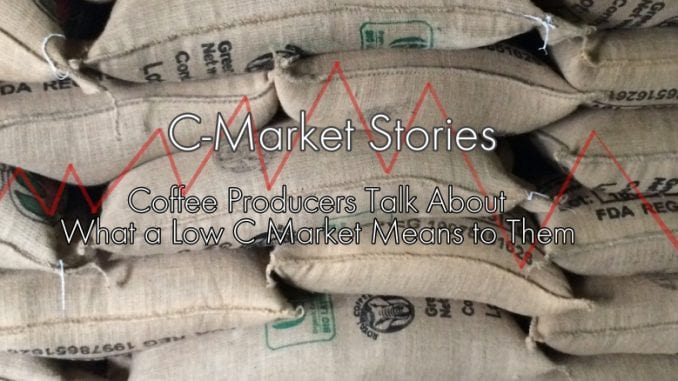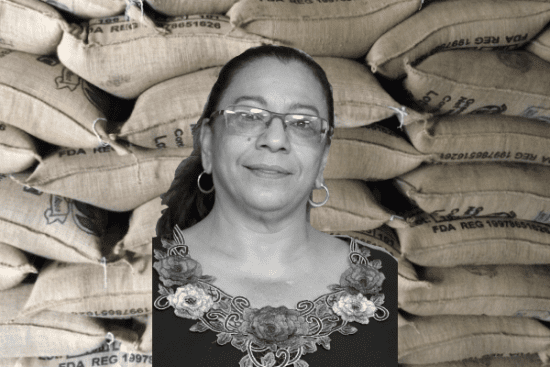
In this new series on Barista Magazine Online, coffee producers talk about what a low C-market price means to them.
BY KENNETH R. OLSON
The global commodity market for coffee has recently fallen to a 12-year low, dropping below $1.00/lb. and in many cases falling below the cost of production for coffee farmers. At the World Coffee Producers’ Forum in September, Roberto Velez CEO of the Colombian Coffee Growers Federation (FNC) said, “It is today a desperate moment for the 25 million coffee growers around the world. It is a crisis beyond imagination.”
At the same event, Rene Leon Gomez, the executive secretary of Promecafe—which is based in Guatemala and represents many Central American coffee farmers—said, “I would say millions of producers in the region are desperate right now. A lot of farms are being abandoned, social conditions have deteriorated.”
With these dire warnings in mind, and with the well-being of coffee farmers and the future of our industry weighing heavily on our hearts, we wanted to talk to some specialty-coffee producers from around the coffee-growing world about what a low C market means to them, how it affects their farms, and what kind of an impact the collapsing C has on their communities.
We have more coverage on the C market in the December 2018 + January 2019 Issue of Barista Magazine: Chris Ryan writes about the C market and why it’s important even to specialty producers in “A Volatile Presence: Understanding the C Market and How It Works.”
In this series, we hear directly from coffee producers about how the low C impacts them; in this installment, we talk with Fatima Ismael from Nicaragua.

Fatima Ismael is the director of Soppexcca, a union of 16 co-ops representing 650 farmers in Jinotega, Nicaragua. She is friendly, approachable, and never without a smile, and even though Nicaragua is in political turmoil right now, she and her fellow members of Soppexcca are committed to maintaining their quality. She beams with pride when saying that in spite of everything, they still delivered all of their coffee to market on time. “Even in the crises we were able to get the shipments out,” she says. “We met all the shipping time and got all of our coffee out.”
She says the effects of the falling C market are “primarily affecting the cost of production for families. This causes delays in programs to improve livelihoods for farmers and their families.”
Fatima says, “The value of the co-op in times like this [is that] they can share the risk or mitigate it by spreading the risk [across the membership.] It also helps to get access to financing.” Because of the support of the co-op, she says, her members are continuing to invest in their farms. “Despite all the political unrest, they’ve fertilized their farms and are getting ready for the next harvest.”
The fallout from the dropping C lands hardest, she says, on farmers who try to go it alone. “A producer who is not a part of the cooperative does not have access to the financial support [the co-op can provide.]” And that financial support extends beyond low-interest loans; it also includes education and information on how and when to invest for the farmers, including investing in alternative revenue streams.
“Producers outside of the co-ops who sell to coyotes are going to be hit hard,” she says. “You have to follow the production norms to be a part of the co-op. Producers may not join a co-op because they have certain rules. In normal times it may seem like too much of a hassle, but now you see the benefits. During this time, people see the value of being in a co-op.”
At the co-op, Fatima says they’re “working on programs for specialty coffee [including] differentiated coffee, brands, fair trade, and organic certifications.” But, she adds, “When the C market drops, it’s hard to maintain balance.” Certifications, she says, help support farmers by providing a premium over the C market. But that can only do so much.
“Regardless of that,” Fatima continues, “in Nicaragua we’re having 30 percent reductions in production, plus [the ongoing] political crisis is having a big economic impact on the country and all of the families.”
“The C-market crisis has affected the whole country,” she says. But, she adds, “The political crisis is a really strong factor.”
For coffee buyers, Fatima, says, “Nicaragua should be given special attention because of these challenges. Keeping relationships through this is very important. Producers want to keep producing in times of peace and in times of unrest.”
“The producer members of Soppexcca are committed in the fight,” she says. “They’ve diversified their income. They have a cacao program, and honey, to diversify income. It’s something we learned from past crises and price drops. That way they are guaranteed to have their consumption needs met from their farms, and if they have surplus, they can sell it.”
Despite all of the challenges they’re facing, Fatima says the co-op members are determined to keep cultivating coffee. “We have to keep going,” she says. “We have to keep betting on coffee. We have to keep trying to raise awareness about how coffee is trying to help the environment. All of our coffee is shade grown, even if that doesn’t have any economic recognition.”
“We have to recognize the value of coffee so families will continue to do it,” Fatima says. “It has its weaknesses, but it still has a future. It’s cyclical so we have to keep working and be ready.”
Additionally, Fatima says, establishing ongoing relationships with the people buying their coffee is important. “We have to keep working on our relationships. It’s a factor that really helps. It gives the producers security. It’s not having CoE (Cup of Excellence) really high prices [that helps]. It’s getting a stable price. The reason a lot of organizations are still functioning is because of these relationships.”
She says people in coffee-consuming countries need to realize that “economic sustainability and environmental sustainability also needs sustainable relationships.”
And, she adds, “Buyers need to think about the families, and how they’re affected by these prices.”
It’s important to her that baristas and café owners are “aware of where my coffee is coming from and the real story behind it. They should know the positive things about Nicaragua. Despite they crisis, we’re working very hard every day toward our coffee culture and maintaining quality. Despite all the challenges, we’re always fighting.”
When confronted with the collapsing C market, Fatima says, the members of her co-op will not give up. “They wipe away their tears and get to work smiling quickly,” she says.

